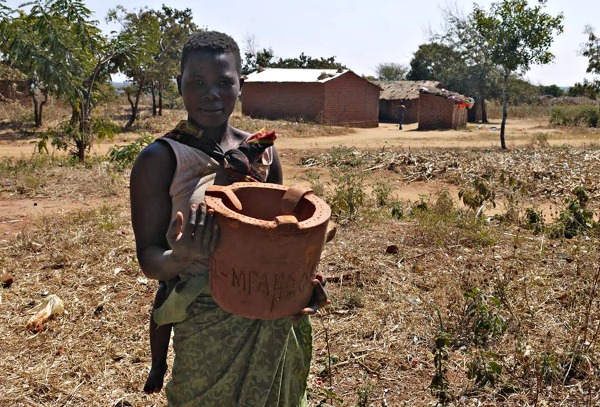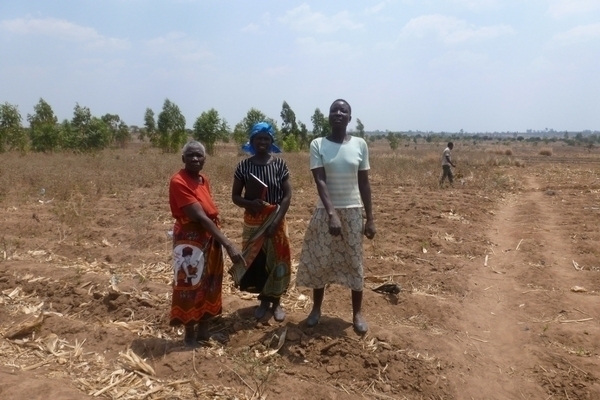
Chitetezo mbaula is a low-carbon-emitting energy-efficient stove produced and distributed by JCED.
Pope Francis invites us “to acknowledge our contribution, smaller or greater, to the disfigurement and destruction of creation”. In other words, what is needed is not only the change of some countries or some people but the change of the whole of humanity. Each of us, at a personal level, is responsible for the global ecological crisis. Consequently, each person has to change his or her habits in order to preserve “our common home”.
One could wonder how the poor inhabitants of the largely rural country of Malawi have contributed to the distruction of “our common home” and what form of change they need to embrace in order to contribute to its healing?
The following examples show how people living in rural areas of the country have participated in the destruction of the ecosytem.
Deforestation is one of the major ecological destructions on the landscape of Malawi. Because just a paltry 10% of its nearly 17 million people is connected to the national grid of electricity, and natural gas is nearly non-existent, biomass energy, mainly wood, is the major source of energy. Domestically, most women in villages and rural areas of Malawi use the traditional three-stone fire to cook or boil water. Regrettably, this fire has a very high rate of energy loss and uses a lot of firewood.
Obviously this has far-reaching repercussions for the limited forests of Malawi as people cut down trees for their energy needs. Tobacco curing and the construction industry, which largely depend on bricks that are baked in wood-fired kilns, are the other major drivers of deforestation in Malawi. Farmers have equally contributed to the ecological crisis through mono cropping – the growing of the same crop – and the wanton use of chemical fertilisers and herbicides, which contributes to the depletion of the soil.
Ironically, most examples of ways in which Malawians contribute to the ecological crisis constitute their only livelihoods. This points to the reality of the nexus of poverty and environmental degradation that many scholars have highlighted as self-reinforcing realities. Therefore, it is important to ask how poor people in Malawi, most of whom are smallholder farmers, can take care of their families without damaging “our common home’’.
The Jesuit Centre of Ecology and Development (JCED) in Malawi, focuses on the this question and tries to find an adequate answer. Inspired by Pope Francis’ seminal encyclical on the environment, Laudato Si’, JCED’s approach is ecological in nature as it seeks to respond to both of the needs of the poor and the of the environment. According to Pope Francis, “we have to realise that a true ecological approach always becomes a social approach; it must integrate questions of justice in debates on the environment, so as to hear both the cry of the Earth and the cry of the poor.”

JCED, Malawi. Female farmers in Kasungu use contour ridging as a soil and water conservation technique
One of the examples of JCED’s practical interventions is its Environment and Food Security project (EFS) in the rural district of Kasungu. The project, funded by Misean Cara, ultimately seeks to build the capacity of the vulnerable smallholder farmers to produce sufficient food for their households while taking care of the environment. To achieve this goal, JCED promotes conservation agriculture, a system of farming that, among other agro-ecological practices, encourages the use of organic manures as opposed to artificial fertilisers that are not only too expensive for the poor farmers but also highly degrading to the soils.
JCED has also been promoting reforestation and the adoption of ceramic energy-efficient stoves in all its projects. For instance, in its EFS project over 23,000 agroforestry tree seedlings have been distributed to smallholder farmers and planted. And over 2,000 households are now enjoying the economic, health and environmental benefits of the low-carbon-emitting energy-efficient stoves, which were produced and distributed by JCED. Women and children are particularly pleased with the stoves because of their reduced exposure to noxious fumes and consequent respiratory diseases, which are often associated with the use of the high carbon-emitting traditional fire.
Author: Fr Adrian Makasa Cikwamo SJ, Director of JCED. 12th December 2017

